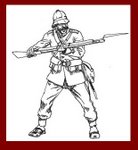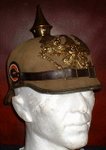From Graham Evans at Science versus Pluck
********************************************************
If any of you haven't noticed, that fine chronicler of Victorian
colonial warfare, George MacDonald Fraser died earlier this
week. I attach the notification from the BBC website.This is
obviously very sad for all fans of his writing & not just the
Harry Flashman books. Inevitably all of us who have read
and loved the books can only lament at the information we
will now never know. How did Flash Harry get to Mexico?
How did he fight on both sides of the ACW? How did he get
back from China?
*********************************************************
The only answer is for a noted author and fan of Victorian
memoirs to take up the challenge and complete
the series from GMF's notes.
If any of you haven't noticed, that fine chronicler of Victorian
colonial warfare, George MacDonald Fraser died earlier this
week. I attach the notification from the BBC website.This is
obviously very sad for all fans of his writing & not just the
Harry Flashman books. Inevitably all of us who have read
and loved the books can only lament at the information we
will now never know. How did Flash Harry get to Mexico?
How did he fight on both sides of the ACW? How did he get
back from China?
*********************************************************
The only answer is for a noted author and fan of Victorian
memoirs to take up the challenge and complete
the series from GMF's notes.
*********************************************************
Anyway, to all members of the group, if you haven't already done
so, raise a glass to the memory of the finest historical novelist ever
this evening.
Anyway, to all members of the group, if you haven't already done
so, raise a glass to the memory of the finest historical novelist ever
this evening.
Graham































3 comments:
George MacDonald Fraser: Writer whose tales of Flashman changed the face of British historical fiction
George MacDonald Fraser, writer and journalist: born Carlisle 2 April 1925; deputy editor, Glasgow Herald 1964-69; FRSL 1998; OBE 1999; married 1949 Kathleen Hetherington (two sons, two daughters); died Strang, Isle of Man 2 January 2008
Published: 04 January 2008
It needed only a few moments exposure to one of his reminiscing public performances to establish that George MacDonald Fraser had led quite a life. His experiences included being held upside down by his heels, while strafed by Japanese sniper fire, as he foraged for water during the Burma Campaign of the Second World War, basking in the admiration of Charlie Chaplin and worrying about whether Burt Lancaster disliked his film scripts. Posterity, on the other hand, will remember him for a single achievement. This was the creation, or rather the re-creation, of Harry Flashman, originally the villain of Thomas Hughes's Victorian morality tale Tom Brown's Schooldays (1857), but remodelled, under MacDonald Fraser's expert grasp, into the star of a dozen books that changed the face of British historical fiction.
MacDonald Fraser came late to authorship: he was already in his mid-forties when the first Flashman novel inspired in P.G. Wodehouse what he called "that watcher-of-the-skies-when-a-new-planet stuff", with a quarter-century's military service and bread-and-butter journalism behind him. Though no one could have been more Scottish in his outward demeanour, George MacDonald Fraser was a Carlisle doctor's son, and educated at the town's grammar school, before indifferent exam results prompted a relocation to Glasgow Academy. A fan of blood-and-thunder historical novels since pre-teendom – he discovered Rafael Sabatini's Captain Blood at the age of 10 – MacDonald Fraser was also fascinated by the history of the Anglo-Scottish border. This interest later produced two full-length novels (The Candlemass Road, 1993 and The Reivers, 2007) and a historical work, The Steel Bonnets (1971).
In 1943, aged 18, and fearing that he would never amass the qualifications necessary to enter Glasgow University's medical school, he enlisted in the Border Regiment and was sent to India. Quartered Safe Out Here (1992), his memoir of the Burma Campaign, is one of the great military autobiographies: unsparing in its head-first immersion in the horrors of war, but also – a characteristic of nearly everything MacDonald Fraser wrote – extremely funny. Among other exploits he was promoted to lance-corporal on four occasions, but three times broken to private for minor infringements of army routine. One of these involved losing a tea urn. Subsequently he was given a commission in the Gordon Highlanders and served with the regiment in the Middle East and North Africa, eventually leaving the army in 1947. This period in his life forms the back-drop to the semi-autobiographical "McAuslan" stories, collected in The General Danced at Dawn (1970), McAuslan in the Rough (1974) and The Sheikh and the Dustbin (1988).
Returned to Carlisle, MacDonald Fraser embarked on a career in journalism. Beginning with a post on the Carlisle Journal, this took him briefly to Canada and then to Glasgow, where he settled with his family in 1953. He had married Kathleen Hetherington, a reporter on a rival paper, in 1949. Passed over for ultimate preferment on the Glasgow Herald – though at one point he rose to the post of acting editor – he determined, as he put it to his wife, "to write us out of this".
The result was a novel based on "The Flashman Papers", supposedly a mass of hand-written manuscripts discovered during a sale of household furniture at Ashby, Leicestershire in 1965 but in fact deriving from MacDonald Fraser's own exhaustive researches among the Victorian history books.
The distinguishing mark of the Flashman series, which eventually ran to a dozen instalments, is its historical detail. Harry Paget Flashman, its motivating force, may in the end be only an inspired invention, but the world in which he moves is sharply and accurately laid out. As well as offering readers the comparatively rare spectacle of an unreal person at large in a real world, MacDonald Fraser added a further refinement. Unlike the conventional heroes of historical fiction, Flashman is a coward, a bully and a satyromaniacal philanderer. The fistfuls of honours and decorations with which he is routinely showered (these include a General's rank, the Victoria Cross, the Queen's Medal and the thanks of Parliament) are invariably the result of grotesque accidents.
This worm's-eye view of history gives the books a significant internal dynamic. Knowing that Flashman is a self-advertised moral absence, the reader believes everything that he says, on the grounds that he has no reason to dissemble. All this realises a scarifying, but often bitterly humorous, critique of the Victorian Imperial project, which Flashman witnesses at first hand for upwards of half a century. Here, for example, in Flashman at the Charge (1973), he ruminates on the Crimean campaign of 1854 in which, inevitably, he manages to breast the guns at Balaclava and foil a Russian plot to invade India:
I was as close to the conduct of the war in the summer of 1854 as anyone, and I can tell you truthfully that the official view of the whole thing was:
"Well, here we are, the French and ourselves, at war with Russia, in order to protect Turkey. Ve-ery good. What shall we do, then? Better attack Russia, eh? H'm, yes. (Pause). Big place, ain't it?"
Turned down by nearly every publisher in London, Flashman, which follows its anti-hero ingloriously through the Afghan War of 1841-42, was an instant success. In subsequent adventures, Flashman impersonates Danish royalty in a rewrite of The Prisoner of Zenda (Royal Flash, 1970), gets mixed up in the slave trade (Flash For Freedom!, 1971), sails a war canoe with Rajah Brooke in Borneo (Flashman's Lady, 1977), is the solitary survivor of Custer's army at the Battle of the Little Big Horn (Flashman and the Redskins, 1982) and holes up with the US abolitionist John Brown at Harper's Ferry (Flashman and the Angel of the Lord, 1994). Among a riot of encounters with the great and good, he becomes the intimate of Bismarck, Queen Victoria, Lincoln, Ulysses S. Grant and Ranavalona, the deranged and lustful monarch of 1840s Madagascar.
The pace and vigour of MacDonald Fraser's prose had him bracketed with Stevenson by discerning critics, but there were also comparisons with tough-minded 18th-century realists such as Tobias Smollett. A small part of his vast international fan-base – mostly deluded Americans – continued to believe that the books were genuine historical documents and Macdonald Fraser merely their editor.
From the early 1970s, on the back of Flashman's success, MacDonald Fraser pursued a second and yet more lucrative career as a Hollywood screen-writer. Here his credits included The Three Musketeers (1973), a sequel, The Four Musketeers (1974), Royal Flash (adapted from the novel, 1975), the James Bond vehicle Octopussy (1983) and Red Sonja (1985), featuring the young Arnold Schwarzenegger.
Royal Flash, starring Malcolm McDowell and Britt Ekland, was not a success: there were obvious difficulties in reproducing the Flashman "voice" in any medium beyond the page, and no subsequent adaptation ever reached the widescreen. As The Light's On at Signpost (2002), his Hollywood memoir, makes clear, MacDonald Fraser came from a generation for whom the novelty of cinema never waned: the shaky transit of – say – an aged Gregory Peck across a restaurant foyer always has him delightedly turning his head.
In his personal dealings, MacDonald Fraser combined an occasionally rugged reserve with an extreme courtesy. He was devoted to his wife, Kathleen, and delighted in the success of his novelist daughter Caro. As he grew older, living in the tax exile's seclusion of the Isle of Man, his political and social views became markedly hard-line. The Light's On at Signpost is interspersed, and – most readers would have said – marred by periodic teeth-gnashings on the subject of law and order, New Labour and other outrages.
Exposure to a typical MacDonald Fraser audience, which tended to reflect these opinions, could occasionally unnerve some of his more "literary" admirers. A younger acquaintance who had conducted a conversazioni with him at the Royal Army Museum in Chelsea, in front of an audience largely composed of serving soldiers, remarked that the experience made him feel "vaguely homosexual and left-wing".
Although MacDonald Fraser kept writing almost to the end – he could be glimpsed in Hatchard's only a month or two ago signing copies of The Reivers for a queue stretching towards the door – the last decade of his life was a thin time for Flashman-fanciers, with only a book of fragmentary pieces (Flashman and the Tiger, 1999) and an account of the Abyssinian War of 1868 (Flashman on the March, 2005) to break the drought.
One of the great sadnesses of MacDonald Fraser's death is that, to judge from various hints strewn around the novels, there were at least four more Flashman adventures waiting to be written. What did he get up to in the American Civil War? How did he survive Rorke's Drift? What precise exploit, presumably in the Mexican Revolution, had him awarded the San Serafino Order of Purity and Truth (Fourth Class)? Now, alas, we shall never know.
An OBE and a belated Fellowship of the Royal Society of Literature aside, MacDonald Fraser received no formal recognition for his work, won no literary prizes and goes unmentioned in the Oxford Companion to English Literature. This neglect did not appear to trouble him. But he belonged to what in these days is an almost exclusive category – the blood-and-thunder merchant who, however much he shies away from the fact, is also a genuine literary artist.
D.J. Taylor
A sad loss to the genre indeed!
I've been intending to read the series, now I must...
Post a Comment